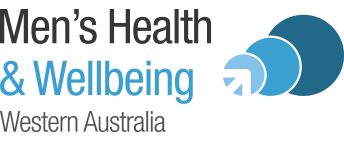Community leaders agree to collaborate to improve the lives of men and boys in WA
A new era of cross-sector collaboration and resource sharing promises to end siloed approaches that have so far failed to sufficiently impact on many of the crises impacting the lives of WA boys and men.
At the State Library of WA Theatrette in this Men’s Health Week 2019, over 130 leaders and representatives of WA’s peak Private, Public, Union, Sporting Groups, and NFP organisations, agreed that we need to be doing more to turn many negative health and wellbeing trends around. Those present unanimously agreed that it was time for a fresh approach – time to embark on a collaborative ‘whole-of-community’ response.
Facilitated by sector peak-body Men’s Health & Wellbeing WA (MHWWA) the assembly launched and welcomed the WA Government’s Men’s Health Policy. The meeting then took the opportunity for a cross-sector discussion of the growing crises facing WA’s boys and men.
Dean Dyer MHWWA board member and representative on the consultation group which informed the Policy’s development, said; “ Men and boys in WA continue to face much poorer outcomes than women and girls on many key health and wellbeing indicators. Males have significantly shorter life expectancy, a far greater burden of disease, the majority of injuries, workplace fatalities, road trauma, homelessness, jail population, children’s behaviour problems and learning difficulties at schools. We fully acknowledge and thank the WA Govt and all those who helped to make this policy a reality.”
It is both revealing and shocking that the leading cause of death in 15-44 year-old Australian males is suicide.
MHWWA Chair Dennis Beros said the meeting’s outcomes were a clear call to action in tackling these critical issues. “I came away with a strong sense that attendees wanted a ‘whatever it takes’ approach to turn the tide. The meeting agreed that deep cross-sectoral conversations on all the issues were urgently needed and those present committed to participate in a series of whole-of-community ‘round tables’ over coming months. These will aim to map out existing programs, initiatives and services, and uncover obstructions, duplications, inefficiencies, and gaps. From there, we can identify opportunities to cooperate, collaborate, and better direct resources to save and improve the quality of the lives of our boys and men.”
More information about the policy can be found at menshealthwa.org.au. For more information on the coming round-table programs contact MHWWA at admin@menshealth.org.au.

NEWS CATEGORIES
GET INVOLVED
Community leaders agree to collaborate to improve the lives of men and boys in WA
A new era of cross-sector collaboration and resource sharing promises to end siloed approaches that have so far failed to sufficiently impact on many of the crises impacting the lives of WA boys and men.
At the State Library of WA Theatrette in this Men’s Health Week 2019, over 130 leaders and representatives of WA’s peak Private, Public, Union, Sporting Groups, and NFP organisations, agreed that we need to be doing more to turn many negative health and wellbeing trends around. Those present unanimously agreed that it was time for a fresh approach – time to embark on a collaborative ‘whole-of-community’ response.
Facilitated by sector peak-body Men’s Health & Wellbeing WA (MHWWA) the assembly launched and welcomed the WA Government’s Men’s Health Policy. The meeting then took the opportunity for a cross-sector discussion of the growing crises facing WA’s boys and men.
Dean Dyer MHWWA board member and representative on the consultation group which informed the Policy’s development, said; “ Men and boys in WA continue to face much poorer outcomes than women and girls on many key health and wellbeing indicators. Males have significantly shorter life expectancy, a far greater burden of disease, the majority of injuries, workplace fatalities, road trauma, homelessness, jail population, children’s behaviour problems and learning difficulties at schools. We fully acknowledge and thank the WA Govt and all those who helped to make this policy a reality.”
It is both revealing and shocking that the leading cause of death in 15-44 year-old Australian males is suicide.
MHWWA Chair Dennis Beros said the meeting’s outcomes were a clear call to action in tackling these critical issues. “I came away with a strong sense that attendees wanted a ‘whatever it takes’ approach to turn the tide. The meeting agreed that deep cross-sectoral conversations on all the issues were urgently needed and those present committed to participate in a series of whole-of-community ‘round tables’ over coming months. These will aim to map out existing programs, initiatives and services, and uncover obstructions, duplications, inefficiencies, and gaps. From there, we can identify opportunities to cooperate, collaborate, and better direct resources to save and improve the quality of the lives of our boys and men.”
More information about the policy can be found at menshealthwa.org.au. For more information on the coming round-table programs contact MHWWA at admin@menshealth.org.au.

NEWS CATEGORIES
GET INVOLVED
SUBSCRIBE TO OUR QUARTERLY NEWSLETTER
If you are in an emergency, or at risk of harm to yourself or others, please contact emergency services on 000.
PO Box 551, Wembley WA 6913 | Phone: 0499 076 925
PO Box 551, Wembley WA 6913
Phone: 0499 076 925
© Copyright 2021 All Rights Reserved. Men’s Health & Wellbeing WA
© Copyright 2021 All Rights Reserved.
Men’s Health & Wellbeing WA
